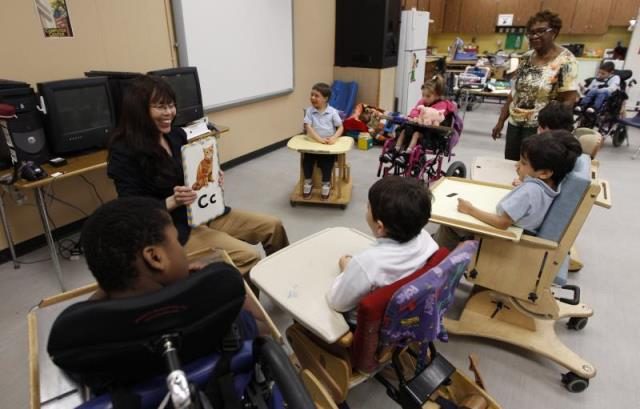A new state law is the fulfillment of one north Texas mother’s 10-year mission to mandate that public schools place surveillance cameras in special needs classrooms to protect students after her son was physically abused by a teacher.
Senate Bill 507 requires school districts and open-enrollment charter schools to install, operate, and maintain video cameras and audio recording equipment in some special education classrooms if requested by a classroom parent, trustee, or staff member. The Texas Legislature passed the law in 2015.
The Fort Worth Star-Telegram reported Breggett Rideau is the special needs parent who lobbied state lawmakers for a number of years to bring such legislation to fruition. She asked the Keller Independent School District for a camera in her son’s classroom as early as 2006, but was told it would be illegal to do so.
Between 2008 and 2010, Rideau alleged her son Terrance, who does not have the ability to speak and is wheelchair-bound, sustained physical abuse injuries such as a fractured thumb, dislocated knee and a head contusion caused by a Keller middle school special education teacher no longer with the district. In 2013, the Rideau family sued Keller ISD in federal court and won a $1 million judgment.
Subsequently, Rideau made at least 20 trips to Austin between 2013 and 2015 to gain support for her cause. She even hired lobbyists during to push the legislation over the finish line last year.
“I didn’t have a clue how to do this when I started,” she said. “I got a degree in food science, not law and public policy, but I prayed and God helped me,” Rideau told the Fort Worth newspaper.
She believes SB 507 could have protected her special needs son, who attended school in Keller, a Fort Worth suburb, since he was three-years-old. “Every child deserves to be safe in school,” said Rideau, who hopes to expand the law to the federal level to help make classrooms safer for its most vulnerable population, special needs students like her son, who is now 21-years-old. Now, Terrance’s special education classroom at Keller High School is one of the first in the state outfitted with the surveillance equipment, at the request of a parent, the Austin American-Statesman reported.
Under the new law, once a special needs classroom parent requests the installation of surveillance equipment, the other parents of students in that classroom and all staff members of a school must be notified before cameras are activated. The system can store six months of video recordings that also capture “audio from all areas of the classroom or other special education setting.”
The footage can be accessed by the student’s parents if they file a complaint against a school employee or if it is part of an investigation of suspected abuse. However, a Texas Education Agency (TEA) spokeswoman told Breitbart Texas school districts are required to develop local board policies to implement the requirements. Such policies may conceivably impact when and if parents may see the video. For example, Amanda Bigbee, a Keller ISD attorney, told the Star-Telegram a parent would not be allowed to see the video unless a district-level committee first determined that an incident occurred. The TEA surmised Bigbee’s comment related to Keller ISD’s policy. Breitbart Texas was unable to reach Bigbee for comment.
Under an investigation, others able to view the footage include the Texas Department of Family and Protectives Services, personnel, a peace officer, school nurse or administrator trained in de-escalation and restraint techniques.
SB 507 is an unfunded mandate, which means the Texas Legislature appropriated no dollars for its implementation. Neither federal Individuals with Disabilities Education Act (IDEA) nor state special education funds can be used to fund these surveillance systems. School districts are required to pay for the equipment, installation, operating costs, and maintenance through existing funds, although they may “solicit and accept gifts, grants, and donations,” according to Education Commissioner Mike Morath’s updated rules issued on August 15.
Morath identified the anticipated costs will “vary widely from district to district” based on factors including the numbers of special education classrooms and cameras needed per classroom to a district’s size and “existing technological infrastructure.”
He wrote: “On a per classroom basis, school districts have estimated costs ranging between $3,500 and $5,500. School districts have estimated that conducting video surveillance district-wide could cost anywhere from $350,000 to $6.8 million.”
Follow Merrill Hope, a member of the original Breitbart Texas team, on Twitter.

COMMENTS
Please let us know if you're having issues with commenting.